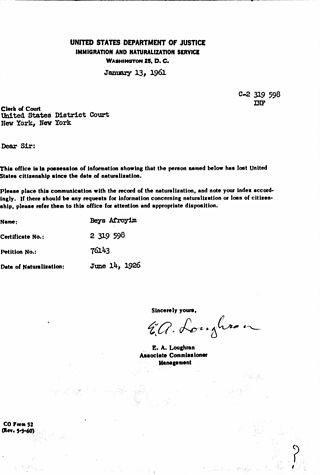
The Fourteenth Amendment to the United States Constitution was adopted on July 9, 1868, as one of the Reconstruction Amendments. Usually considered one of the most consequential amendments, it addresses citizenship rights and equal protection under the law and was proposed in response to issues related to formerly enslaved Americans following the American Civil War. The amendment was bitterly contested, particularly by the states of the defeated Confederacy, which were forced to ratify it in order to regain representation in Congress. The amendment, particularly its first section, is one of the most litigated parts of the Constitution, forming the basis for landmark Supreme Court decisions such as Brown v. Board of Education (1954) regarding racial segregation, Loving v. Virginia (1967) regarding interracial marriage, Roe v. Wade (1973) regarding abortion, Bush v. Gore (2000) regarding the 2000 presidential election, Obergefell v. Hodges (2015) regarding same-sex marriage, and Students for Fair Admissions v. Harvard (2023) regarding race-based college admissions. The amendment limits the actions of all state and local officials, and also those acting on behalf of such officials.
A person is a being who has certain capacities or attributes such as reason, morality, consciousness or self-consciousness, and being a part of a culturally established form of social relations such as kinship, ownership of property, or legal responsibility. The defining features of personhood and, consequently, what makes a person count as a person, differ widely among cultures and contexts.

In mathematical analysis, the maximum and minimum of a function are, respectively, the largest and smallest value taken by the function. Known generically as extremum, they may be defined either within a given range or on the entire domain of a function. Pierre de Fermat was one of the first mathematicians to propose a general technique, adequality, for finding the maxima and minima of functions.
A Roman military diploma was a document inscribed in bronze certifying that the holder was honourably discharged from the Roman armed forces and/or had received the grant of Roman citizenship from the emperor as reward for service.

Solar minimum is the regular period of least solar activity in the Sun's 11-year solar cycle. During solar minimum, sunspot and solar flare activity diminishes, and often does not occur for days at a time. On average, the solar cycle takes about 11 years to go from one solar minimum to the next, with duration observed varying from 9 to 14 years. The date of the minimum is described by a smoothed average over 12 months of sunspot activity, so identifying the date of the solar minimum usually can only happen 6 months after the minimum takes place.

Citizenship in ancient Rome was a privileged political and legal status afforded to free individuals with respect to laws, property, and governance. Citizenship in ancient Rome was complex and based upon many different laws, traditions, and cultural practices. There existed several different types of citizenship, determined by one's gender, class, and political affiliations, and the exact duties or expectations of a citizen varied throughout the history of the Roman Empire.
Freedom of movement, mobility rights, or the right to travel is a human rights concept encompassing the right of individuals to travel from place to place within the territory of a country, and to leave the country and return to it. The right includes not only visiting places, but changing the place where the individual resides or works.

Italian nationality law is the law of Italy governing the acquisition, transmission and loss of Italian citizenship. Like many continental European countries it is largely based on jus sanguinis. It also incorporates many elements that are seen as favourable to the Italian diaspora. The Italian Parliament's 1992 update of Italian nationality law is Law no. 91, and came into force on 15 August 1992. Presidential decrees and ministerial directives, including several issued by the Ministry of the Interior, instruct the civil service how to apply Italy's citizenship-related laws.

German nationality law details the conditions by which an individual is a national of Germany. The primary law governing these requirements is the Nationality Act, which came into force on 1 January 1914. Germany is a member state of the European Union (EU) and all German nationals are EU citizens. They have automatic and permanent permission to live and work in any EU or European Free Trade Association (EFTA) country and may vote in elections to the European Parliament.

The primary law governing nationality of Portugal is the Nationality Act, which came into force on 3 October 1981. Portugal is a member state of the European Union (EU) and all Portuguese nationals are EU citizens. They are entitled to free movement rights in EU and European Free Trade Association (EFTA) countries and may vote in elections to the European Parliament.

Afroyim v. Rusk, 387 U.S. 253 (1967), was a landmark decision of the Supreme Court of the United States, which ruled that citizens of the United States may not be deprived of their citizenship involuntarily. The U.S. government had attempted to revoke the citizenship of Beys Afroyim, a man born in Poland, because he had cast a vote in an Israeli election after becoming a naturalized U.S. citizen. The Supreme Court decided that Afroyim's right to retain his citizenship was guaranteed by the Citizenship Clause of the Fourteenth Amendment to the Constitution. In so doing, the Court struck down a federal law mandating loss of U.S. citizenship for voting in a foreign election—thereby overruling one of its own precedents, Perez v. Brownell (1958), in which it had upheld loss of citizenship under similar circumstances less than a decade earlier.
In persona Christi is a Latin phrase meaning "in the person of Christ", an important concept in Roman Catholicism and, in varying degrees, to other Christian traditions, such as Lutheranism and Anglicanism. In Catholic theology, a priest is In persona Christi because, in the sacraments he administers, it is God and Christ who acts through the instrumentality of the priest. An extended term, In persona Christi capitis, “in the person of Christ the head,” was introduced by the bishops of the Vatican Council II in the Decree on the Ministry and Live of Priests, Presbyterorum Ordinis, December 7, 1965.
The following outline is provided as an overview of and topical guide to the human self:

Manus was an Ancient Roman type of marriage, of which there were two forms: cum manu and sine manu. In a cum manu marriage, the wife was placed under the legal control of the husband. In a sine manu marriage, the wife remained under the legal control of her father.

Ukrainian nationality law details the conditions by which a person holds nationality of Ukraine. The primary law governing these requirements is the law "On Citizenship of Ukraine", which came into force on 1 March 2001.

In ancient Rome, the dediticii or peregrini dediticii were a class of free provincials who were neither slaves nor citizens holding either full Roman citizenship as cives or Latin rights as Latini.
Omnium in mentem is the incipit of a motu proprio of 26 October 2009, published on 15 December of the same year, by which Pope Benedict XVI modified five canons of the 1983 Code of Canon Law, two concerning the sacrament of holy orders, the other three being related to the sacrament of marriage.

Loss of citizenship, also referred to as loss of nationality, is the event of ceasing to be a citizen of a country under the nationality law of that country.

Emirati nationality law governs citizenship eligibility in the United Arab Emirates (UAE). The law is primarily jus sanguinis. Foreigners who meet certain criteria may be naturalized and granted citizenship. Gulf Cooperation Council citizens are allowed to live in the UAE without restriction and have the right of freedom of movement.

The strawman theory is a pseudolegal conspiracy theory originating in the redemption/A4V movement and prevalent in antigovernment and tax protester movements such as sovereign citizens and freemen on the land. The theory holds that an individual has two personas, one of flesh and blood and the other a separate legal personality and that one's legal responsibilities belong to the strawman rather than the physical individual.